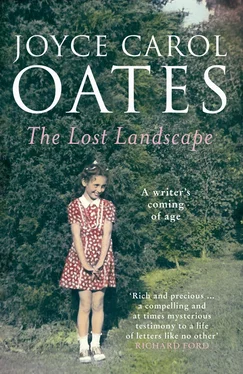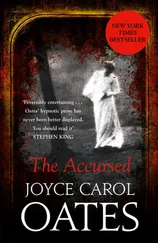In such places there were jukeboxes. Clouded mirrors behind the bar where men who resembled my father turned to welcome him. Pervading smells of beer, cigarette smoke. Plastic ashtrays filled with ashes and butts. Small bowls in which greasy fragments of potato chips remained. If such places were on the vast, wind-lashed lake, there was a sandy beach littered with broken shells. There were picnic areas with tables, benches. Summertime smell of wet sand, wet bathing suits and towels. Burnt charcoal, grilling hamburgers, hot dogs and mustard and ketchup. Broken rinds of watermelon on the ground, corncobs buzzing with flies. Discarded Coke bottles, beer bottles. Music from car radios.
If summer, and if near Lake Ontario, there was always a chance of lightning and thunderstorms. You started off in Millersport on a sunny blue-skied summer day, you ended at Lake Ontario in pelting rain beneath a boiling-black sky in autumnal chill. Even when we had plenty of time to return home, Daddy tended to ignore our pleas and continue driving. Or, if we were already at Lake Ontario, and the sky began to darken ominously, Daddy was likely to delay leaving until the last possible moment.
There came flashes of heat lightning, soundless. Then actual lightning, thunder. Deafening thunder like cymbals crashing. We were chastened waiting for the storm to pass beneath the overhangs of strangers’ roofs, beneath tall windswept trees.
At the Big Tree Inn on a promontory above the lake there was indeed an enormous tree—probably an elm tree. The novelty of the “big tree” was that it had been many times struck by lightning. My mother feared lightning, as her older sister Elsie (my “Aunt Elsie” who lived in Lockport) had in fact been injured when lightning struck a doorway in which she was standing: Elsie’s face, throat, and arm were riddled with slivers from the shattered doorframe; but my mother could not prevail against my father who thought a thunderstorm was an occasion for rejoicing and not cowering indoors.
My mother was not an assertive person. Especially she was not assertive with my father. Mommy might suggest turning back to avoid a storm but she could not insist, and if she had, our father would have ignored her; if she’d insisted more adamantly, our father would have defied her.
Once, not at the Big Tree Inn but at a place called Koch’s Paradise Grove, by chance on my way to a women’s restroom adjacent to the bar, amid a barrage of loud music, a din of voices, laughter, I came across a sight that was shocking to me, and that I have never forgotten: my father speaking with another man, a man of about his age, a stranger whom I was sure I’d never seen before, and they were standing close together, faces flushed and voices raised in anger, and the frightening thought came to me— They are going to fight, they are going to hurt each other; but in the next instant my father turned, and saw me, and the expression on his face altered, and the moment passed.
A child is very frightened—viscerally, emotionally—by the raised voices of adults. Even when anger isn’t involved but rather excitement, hilarity.
I might have registered— They have been drinking. But Daddy is not drunk!
It was not unknown, that men became drunk . But that was very different from being classified as a drunk.
So often it seemed to happen in my life as a child and a young girl, such arrested and abbreviated moments—the scene that is interrupted by the girl blundering into it. If there were words exchanged the intrusion of the girl silenced these words and so it is not words that remain but the sound of a voice or voices, uplifted in anger or in hilarity, essentially indecipherable. It is the child’s experience to blunder into scenes between adults and to become a witness to something inexplicable to her though it is (probably) a quite ordinary episode in what are not extraordinary lives after all; it remains that the child or young adolescent will make of these broken-off and mysterious fragments some sort of coherent narrative. What is fleeting and transient in time, no doubt soon forgotten by the adults, or rendered inconsequential in their lives, may burrow deep into the child-witness’s soul, whatever is meant by “soul” that is not fleeting and transitory but somehow permanent, and inextricable. And so, decades later I am still seeing my father and the unknown, unnamed man, a man who resembled my father, and both of them flush-faced and prepared to fight; I am remembering how my mother’s father died, in a tavern fight in Black Rock in 1917, though long before I was born; I am remembering a casual remark of my father’s— A man never backs down from a fight. You just can’t.
And there were other occasions, like this. Like the Sunday drives, beyond estimation. A child sees her father at a little distance, a figure among other figures; a man among men; a child is baffled and thrilled by her father in precisely those ways in which the father eludes the child. It is as if my father had said to me— You will not ever know me, but it is allowed that you can love me.
The mother is the known , or so the child imagines. (This would turn out to be not exactly true, or not true in the fullest degree, but it was not the case that my mother was inaccessible to me emotionally, as often, in those years, my father was.) But the father is the lesser-known , the more obvious figure of romance.
How many times returning late from Sunday drives into the countryside beyond Lockport, in Niagara County; a nighttime drive back to Lockport and up the long steep glacier hill to the wide bridge over the Erie Canal at the junction of Main Street and Transit Street; and so onto Transit Road (NY Route 78) and another long, steep glacier hill and our house seven miles away in the countryside just across the Tonawanda Creek. Often, my brother and I would drift off to sleep in the backseat of the car. Often, it seemed to be raining. We would hear the slap of windshield wipers, and my parents’ lowered voices in the front seat. Headlights of oncoming cars sweeping into the back of our car, across the ceiling and gone . . .
On a map of the region—(I would not examine a detailed map of Erie and Niagara counties until 2014 while composing this memoir)—the space of our Sunday drives is compressed like something in a children’s storybook. Lake Ontario, that had seemed so romantically far from our home, is fewer than twenty miles away, to the north; Niagara Falls is only twenty-five miles away, to the west. The landscape of my childhood that had seemed so vast, so fraught with mysteries, could be contained within something like a thirty-mile radius.
Sunday drives! You’d think they would continue forever but nothing continues forever. Like gas selling for twenty-eight cents a gallon, that’s gone forever.
“DADDY! CAN I TRY?”
And your father will hand you one of his smaller brushes, its thick-feathery tip dipped in red paint, and a piece of scrap plywood, and on the plywood you will try conscientiously to “letter” as your father lettered—precisely and unhesitatingly, with deft twists of his wrist. But in your inexpert hand the paintbrush wavers, and the lettering is wobbly—childish. The bright red flourish of Daddy’s letters, the subtle curls and tucks of his brushstrokes, will be impossible for you to imitate at any age.
This evening after supper in a season when the sky is still light. When you have left your room upstairs in the farmhouse and crossed to your father’s sign shop in the old hay barn—not a “shop” but just a corner of the barn that has been converted to a two-vehicle garage with a sliding overhead metal door. The shop isn’t heated of course. Your father seems virtually immune to cold (never wears a hat even in winter when icy winds lower the temperature to below zero, often doesn’t wear an overcoat) though he has to briskly rub his hands sometimes when he’s painting signs. When he isn’t working at Harrison Radiator in Lockport, forty-hour weeks plus “time-and-a-half” on Saturdays, Fred Oates is a freelance sign painter whose distinctive style is immediately recognizable in the Lockport/Getzville/East Amherst area, particularly along the seven-mile stretch of rural Transit Road from Lockport to Millersport.
Читать дальше












